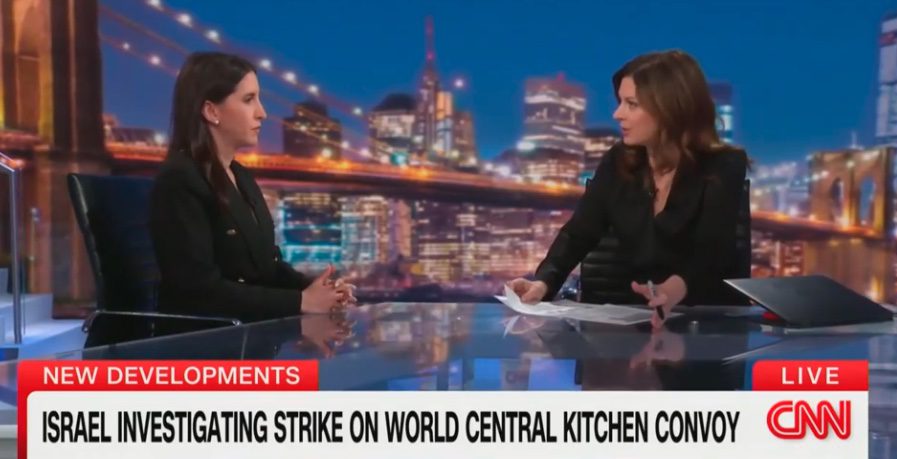CNN’s Erin Burnett engaged in a straightforward discussion on Tuesday with a spokesperson for Israeli Prime Minister Benjamin Netanyahu.
On Tuesday in Gaza, Israeli forces repeatedly targeted a convoy and killed seven aid workers from Jose Andres’ World Central Kitchen. The three-vehicle convoy was traveling in a de-conflicted zone on a route that had been approved by the Israeli army. Each vehicle was struck hit by a drone.
Israeli government officials claimed the attack was unintentional.
Burnett tested that claim during Tuesday’s OutFront on CNN, where she interviewed Netanyahu flack Tal Heinrich:
BURNETT: I’m just going to hone in on the word “unintentional.” In a precision missile environment – which is what Israel conducts – every strike is intentional. You’re aiming for something. So, there was a precise aim, it would appear by any measure of rules of engagement for that particular convoy at that particular time, right?
HEINRICH: I don’t want to jump into conclusions, especially sit here in New York as war is raging in my part of the world back in Israel and jumping to conclusions because I think we have, I don’t have the exact details of what transpired there. And we will have to wait for the finding of the investigation. But what I can say – and I think it’s it’s really important here – is that when we make mistakes, when Israel makes mistakes, even the most tragic ones to admit, and I was here on this program before and we discussed a different [tragedy] that took place during the past six months in which our hostages were mistakenly shot at, three of our hostages. We take responsibility. We admit to the most painful incidents. So, we tell the truth even when it’s the most inconvenient thing to say.
The CNN host then turned to the staggering death toll in Gaza, where Israeli forces have killed more than 30,000 Palestinians after the Oct. 7 attacks in which Hamas militants killed 1,200 Israelis and abducted more than 200 others. As a point of departure, Burnett pointed to Israel’s siege of Al Shifa hospital, which Israeli forces destroyed. After a lengthy introduction, she asked Heinrich how Israel can justify the death toll:
BURNETT: So, let me ask you about something that is a painful truth, and that is the fact that tens of thousands of Gazans have been killed since this began. And many of them are innocent people. And we can talk about what the numbers are, but that is a reality on the ground. Just the past few days, Tal, we have all been confronted with these images from Al Shifa, right? The hospital
And after the 14 day siege that the IDF was conducting, and they say that obviously there were Hamas operatives there, and that that’s what they were targeting. The hospital’s been obliterated. There are bodies everywhere. Obviously, it’s no longer functional.
You say this is necessary to eradicate Hamas. But I do wonder when you talk about inconvenient truths, how does Israel justify killing so many innocent people in this?
HEINRICH: First of all, I’m glad that you said that we need to discuss these numbers because we because we have to take Hamas’ numbers with a huge spoon of salt, not a grain of salt, because what I can tell you, the facts and the truth according to our assessment and the facts that we have, and that is that we we eliminated more than 13,000 Palestinian Islamic jihad terrorists
We took, you know, out 19 of the Hamas battalions out there. One of the reasons why we have to operate in Rafah, for instance – the southern city in Gaza – is because we need to take out the four remaining battalions. We’re talking about 7,000, 8,000 terrorists there. So, the reason why we have to eradicate Hamas, and you also brought brought up this point is because you and I don’t want to sit here in six months, a year, two years, and have this conversation again,
BURNETT: But Tal, aren’t we going to be sitting here? Because a lot of the people there that are losing people in their lives are children and if they survive, they’re going to grow up. And what are they going to think about Israel? What are they going to do? I mean, how can you all actually say you’re eradicating terrorism and eradicating Hamas in the context of what’s actually happening in Gaza?
HEINRICH: Well, we’ll have to look at historical example, you know, Germany after World War II, de-radicalized. And you don’t see, you know, Nazis. You have it as an ideology, but not with, with the grip of a country. This is exactly what we want to do with Hamas. Yes, there will be radicals out there and you can’t root out their ideology to the extent that we wish. But Israel will have to maintain some overriding security responsibility in Gaza two operate against attempts at resurgence of terrorism after and the day after Hamas, I mean. And also work on de-radicalization of the Palestinian society exactly for the reason that you and I don’t want to sit here again and we want to see a better future for Israelis and Palestinians alike.
Watch above via CNN.



